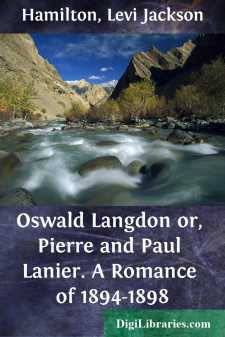Categories
- Antiques & Collectibles 13
- Architecture 36
- Art 48
- Bibles 22
- Biography & Autobiography 813
- Body, Mind & Spirit 142
- Business & Economics 28
- Children's Books 17
- Children's Fiction 14
- Computers 4
- Cooking 94
- Crafts & Hobbies 4
- Drama 346
- Education 46
- Family & Relationships 57
- Fiction 11829
- Games 19
- Gardening 17
- Health & Fitness 34
- History 1377
- House & Home 1
- Humor 147
- Juvenile Fiction 1873
- Juvenile Nonfiction 202
- Language Arts & Disciplines 88
- Law 16
- Literary Collections 686
- Literary Criticism 179
- Mathematics 13
- Medical 41
- Music 40
- Nature 179
- Non-Classifiable 1768
- Performing Arts 7
- Periodicals 1453
- Philosophy 64
- Photography 2
- Poetry 896
- Political Science 203
- Psychology 42
- Reference 154
- Religion 513
- Science 126
- Self-Help 84
- Social Science 81
- Sports & Recreation 34
- Study Aids 3
- Technology & Engineering 59
- Transportation 23
- Travel 463
- True Crime 29
Oswald Langdon or, Pierre and Paul Lanier. A Romance of 1894-1898
Description:
Excerpt
PREFACE
Though to explain incurs a risk, the author accepts the hazard of a word in advance.
While the novelist's license has been so used that there is need neither to resent an innuendo nor to prove an "alibi," yet, substantially, the incidents narrated occurred within the time stated, and nearly all the actors are still upon life's "boards."
The conscientious tourist in search of that "beautiful country-seat" and "wood-fringed lake" is advised to defer his visit. Perhaps the exact locations are intended to be in doubt. Even that "station" might be hard to find in an English train schedule.
Geographical accuracy may not be always essential. One noted writer has told of infatuation for
"An ounce of common, ugly, human dust,"and declared that—
.... "Places are too much,Or else too little, for immortal man."
The reader of few or of many books may find "reminders" in these pages. The author hastens to confess echoings from bygone days, hintings of vagrant fancies, and whimsical reveries wherein appeared the vague evasive outlines of half-remembered things.
If keeping that harmless old connoisseur of the "image and superscription," who insisted on positive "rigor mortis," jailed so long seem heartless, it should be remembered that some wrongs are more apparent than real.
The antecedents of that mysterious fair-haired "Find" are still in doubt, but this signifies little. Child-life is always a miracle more inscrutable than the resurrection of Lazarus.
The hinted fate of Pierre and Paul Lanier may merit some criticism. Perhaps summary justice should have been meted out; but in view of all "extenuating circumstances," may not judgment be suspended? Since "Eternity is so long," and in deference to that "bias for saving," can we not allow an "appeal unto Cæsar"?
Carson Jay Lee.
THE SCARE AND ARREST
Passing along the street, apparently self-absorbed, there seems little in this man to attract notice.
Why does the scared newsboy hurry by, thinking of that strange face?
Quickly the agitated countenance assumes a look of dignified indifference.
A block away the boy resumes his calls:
"All about the murder of a young girl! Body found in the river! Police on track of the murderer!"
"Poor little fellow!" murmured Oswald. "He gave me such a shock! But how frightened he seemed when passing, with his innocent yell! How foolish my scare! What do New York police know or care about a crime committed in London years ago?"
Curious to read what the city papers say of this homicide, Oswald retraces his steps, turns a corner, and sees the boy waiting pay from a pleasant-faced, careful old man, who holds to his purchase while critically scrutinizing the coin, as if sorry to part with such "image and superscription" without approved value.
"Be the girl dead and be she drowned sure?"
"She's a goner!" replied the boy.
This emphatic assurance of "rigor mortis" having convinced the old gentleman that his money will be well invested, the deal is about to be closed, when, seeing Oswald, little Jack sprints across the street, down an alley, into the arms of a policeman.
"Pfwhat yez roonin' loike yez a stalin' wagabond pfhwor?" sternly asks the officer.
"That willanous-lookin' rascal round there is campin' on me trail."
With visions of a kidnaper of small boys fleeing from his wrath, Michael P. O'Brien drags the terrified Jack out of the alley to the street. Seeing the old man holding to the paper and looking dazed, upon this gray-haired malefactor is placed the strong hand of the "statute in such case made and provided," and he is started toward the police-station, with the soothing assurance:
"Yez nadn't confiss yez guilt by discriminatin' ividince."
Seeing that matters are badly mixed, Jack sidles away toward the opposite street-corner. His movement is noted by the policeman at the exact moment that Jack again sees Oswald. Heedless of loud command to "Sthop, in the noime of the law," the youthful auctioneer of the metropolitan press heads at right angles and is soon out of sight.
CHAPTER II
The day has been fearfully hot....


